In order to fully implement the guiding principle of the 20th CPC National Congress, the instructions of General Secretary Xi Jinping’s important speeches during his visit at Renmin University of China (RUC), promote the building of a community with a shared future for mankind, and contribute to the construction of a modernized socialist power, and on the occasion of President Xi Jinping’s invitation to the United States to hold meetings of the Chinese and US heads of government in San Francisco and to attend the 30th informal leaders’ meeting of the Asia-Pacific Economic Cooperation (APEC), RUC founded “Tongzhou Global Development Forum”, which purposes to build a high-end dialogue platform for the political, academic and business circles throughout the international community, the purpose of “focusing on global development and caring for human destiny”, to discuss strategic issues of global development, and to produce forward-looking research results from the three dimensions of global development, global security and global civilization, providing theoretical guidance and intellectual support for the development practices of China and the world.
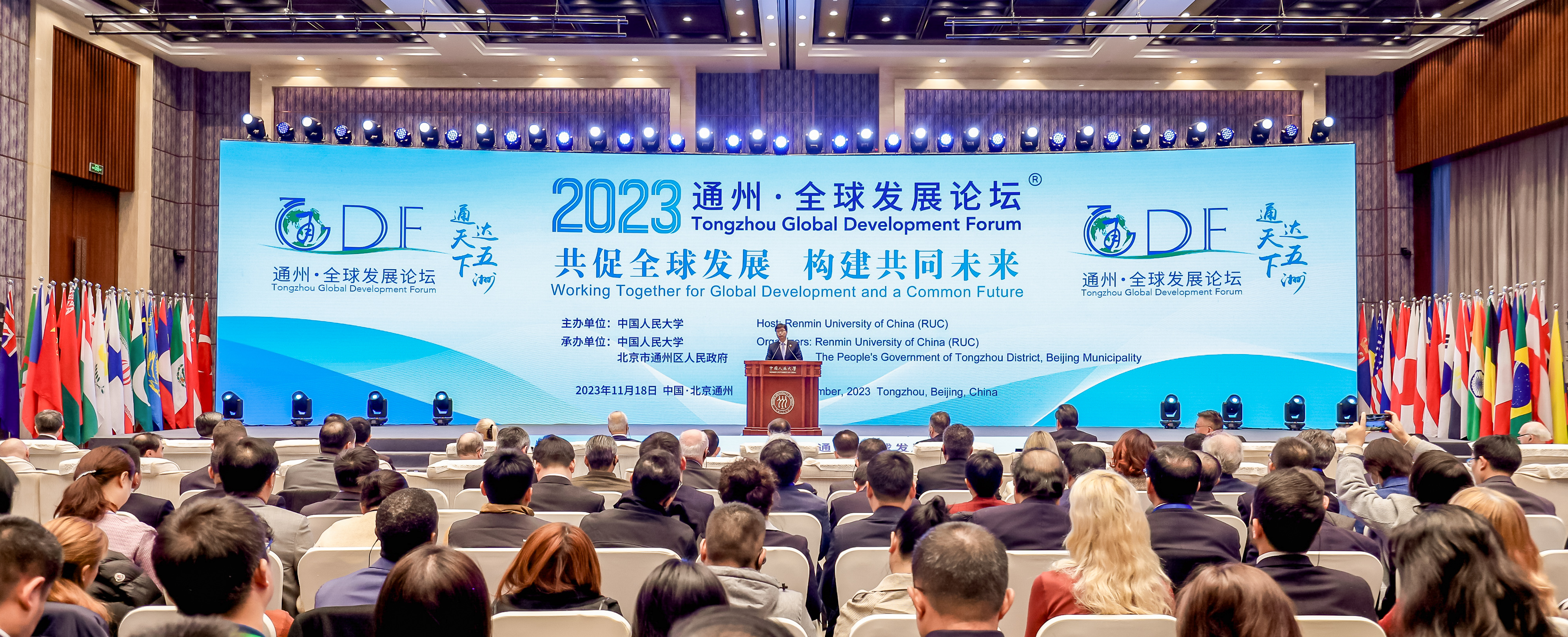
On November 18 and 19, the first “Tongzhou Global Development Forum” was held at the Beijing International Fortune Center. Hosted by Renmin University of China and co-organized by Renmin University of China and the People’s Government of Tongzhou District, the Forum, under the theme of “Working Together for Global Development and a Common Future”, will address how China and the international community stand at the crossroads to solve the conundrum of the century and the quest of the era in light of the great changes that the world has not witnessed in a century, and how it can promote global development, safeguard global security, promote global civilization, and to create strong momentum for building a community with a shared future for mankind and expanding the new forms of human civilization.The forum put forward the theme report of Development as the Solution, Globe as the Platform for Development, and presented seven action plans for the mechanism of “Tongzhou Global Development Forum”.
In attendance were:
- Yin Yong, Mayor of Beijing
- Guo Yezhou, Vice Minister of the International Department of the CPC Central Committee;
- Luo Zhaohui, Chairman of the China International Development Cooperation Agency (CIDCA);
- Fan Yun, Deputy Editor-in-Chief of China Media Group (CMG), Editor-in-Chief of China Global Television Network (CGTN)
- Zhang Donggang, Chair of the University Council, Renmin University of China;
- Cui Tiankai, Former Vice-Minister for Foreign Affairs and former Ambassador to the United States and Japan
- Liu Limin, Former Vice Minister of the Ministry of Education and President of the China Education Association for International Exchange;
- Filip Vujanovic, Former President of Montenegro;
- Adrian Năstase, Former Prime Minister of Romania;
- Vince Cable, Former Business Secretary of the United Kingdom;
Experts and scholars from 30 countries and regions and representatives of universities, as well as ambassadors from different countries attended the opening ceremony.
Lin Shangli, President of Renmin University of China, presided over the opening ceremony.
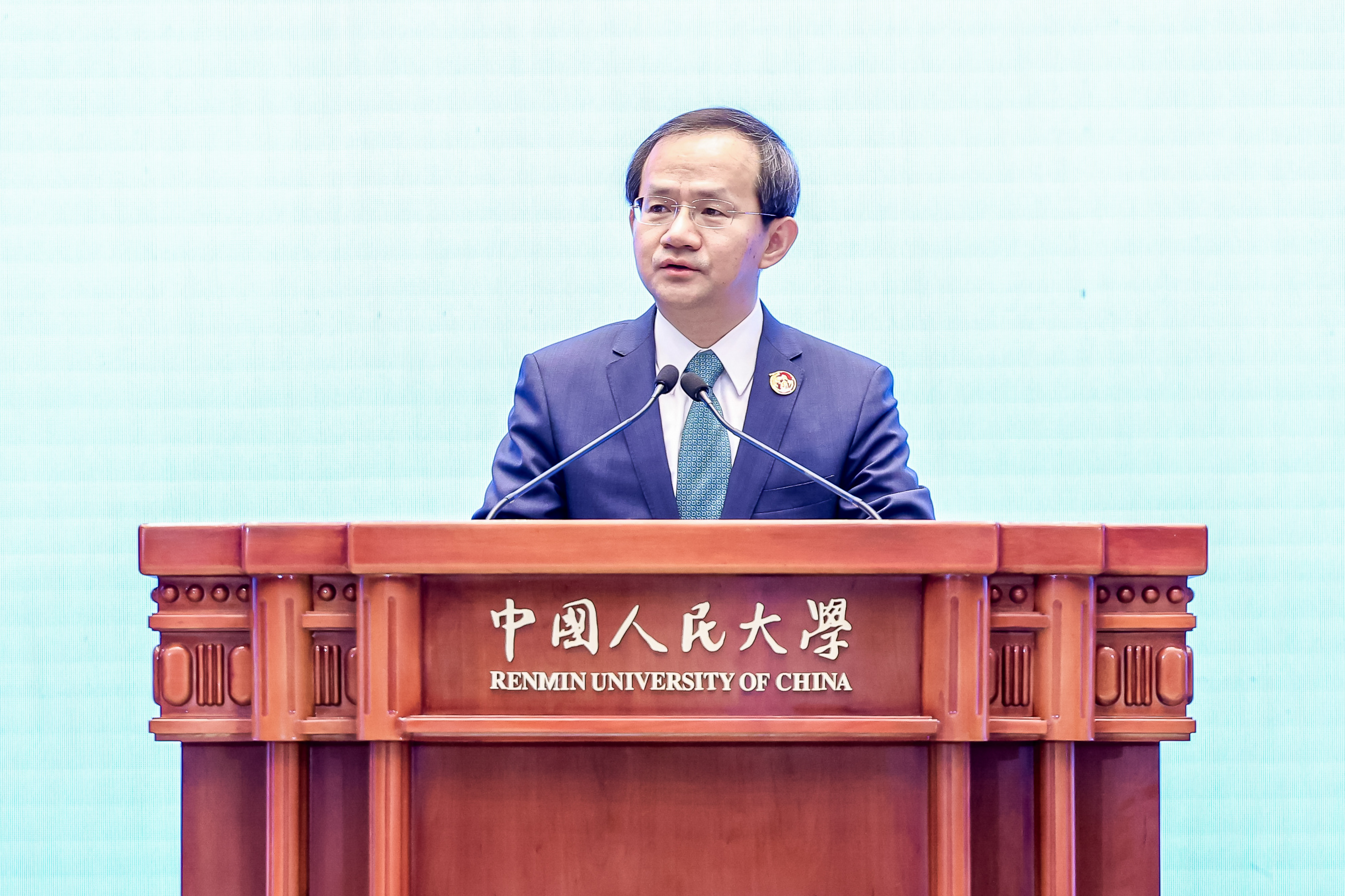
Yin Yong said in his speech that the 2023 Tongzhou Global Development Forum, as a response to the “Three Global Initiatives”, is a high-end platform for the communication of global think tanks. The forum centers on the theme of Working Together for Global Development and a Common Future and active discussion concerning the theme were made during the event.The 2023 Tongzhou Global Development Forum will make positive contributions to the progress of global common development and the building of a community of shared future for mankind by by building up the consensus of all parties on development. With the new era of reform and opening up and with the new historic achievements in the new era, the capital's high-quality development has continuously stepped up to a new level. As an international metropolis with unique charms, Beijing is striving to play a leading role in scientific and technological innovation, accelerate its integration into the global innovation network, and speed up its efforts to become a global source of original innovations and a high level talent base in the world; It is striving to promote a high level of opening up to the outside world, proactively integrating into the new development pattern, and becoming the first choice for foreign investment in China; Beijing is also striving to build a modernized urban governance system, and continuously realizing the people's aspirations for a better life and providing a safe, comfortable and convenient life for all kinds of enterprises and talents in Beijing. Nowadays, Beijing is striding forward towards the goal of taking the lead in basically realizing socialist modernization, and we hope that you will, as always, care about, support and participate in the construction and development of Beijing, and share the development opportunities and create a better future with Beijing.
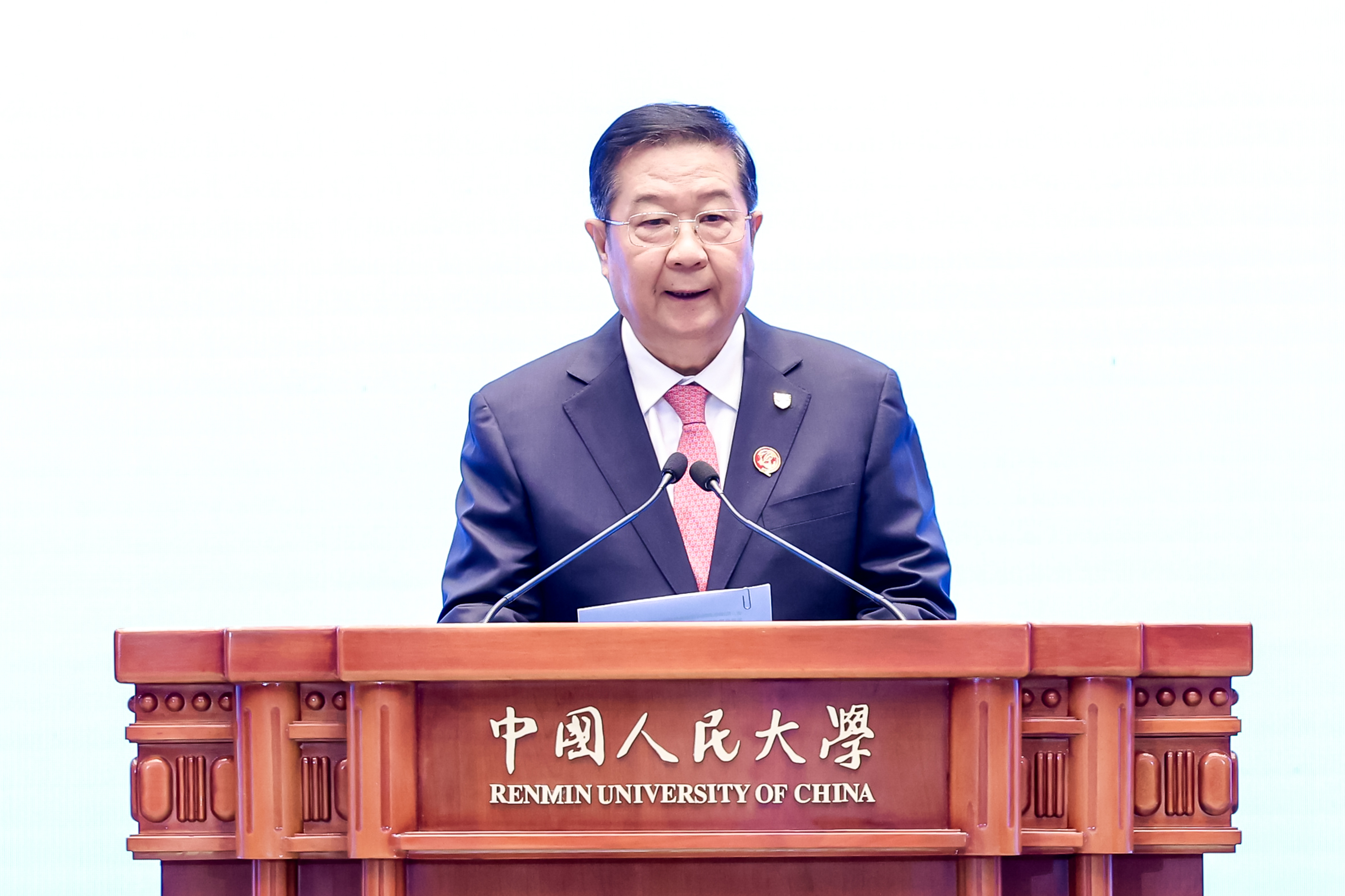
Liu Limin said in his speech that the “Three Global Initiatives” put forward by President Xi Jinping are important guidelines for the development of humanity from the perspectives of development, security and civilization.The initiatives greatly boosted the trend of global history. As a producer of knowledge, education has an irreplaceable role in realizing the sustainable development goals. It is hoped that Renmin University will leverage the “Tongzhou Global Development Forum” as an opportunity to build a platform for the communication of high-level think tanks, making even greater contributions to global development. Our objectives are to promote education to empower development, carry out solid academic exchanges and knowledge sharing, and present strong drivers for global development with more effective and advanced academic results and decision-making basis; promote education to empower security, carry out in-depth research and discussion on international order and international relations, and conduct in-depth exchanges and sharing of strategic and security issues, making our decision-making more forward-looking, targeted and effective; promote education to empower civilization exchanges, establish a global civilization dialogue and cooperation network in deepening exchanges and strengthening protection, thereby co-authoring a new chapter of civilization exchanges and mutual understanding.
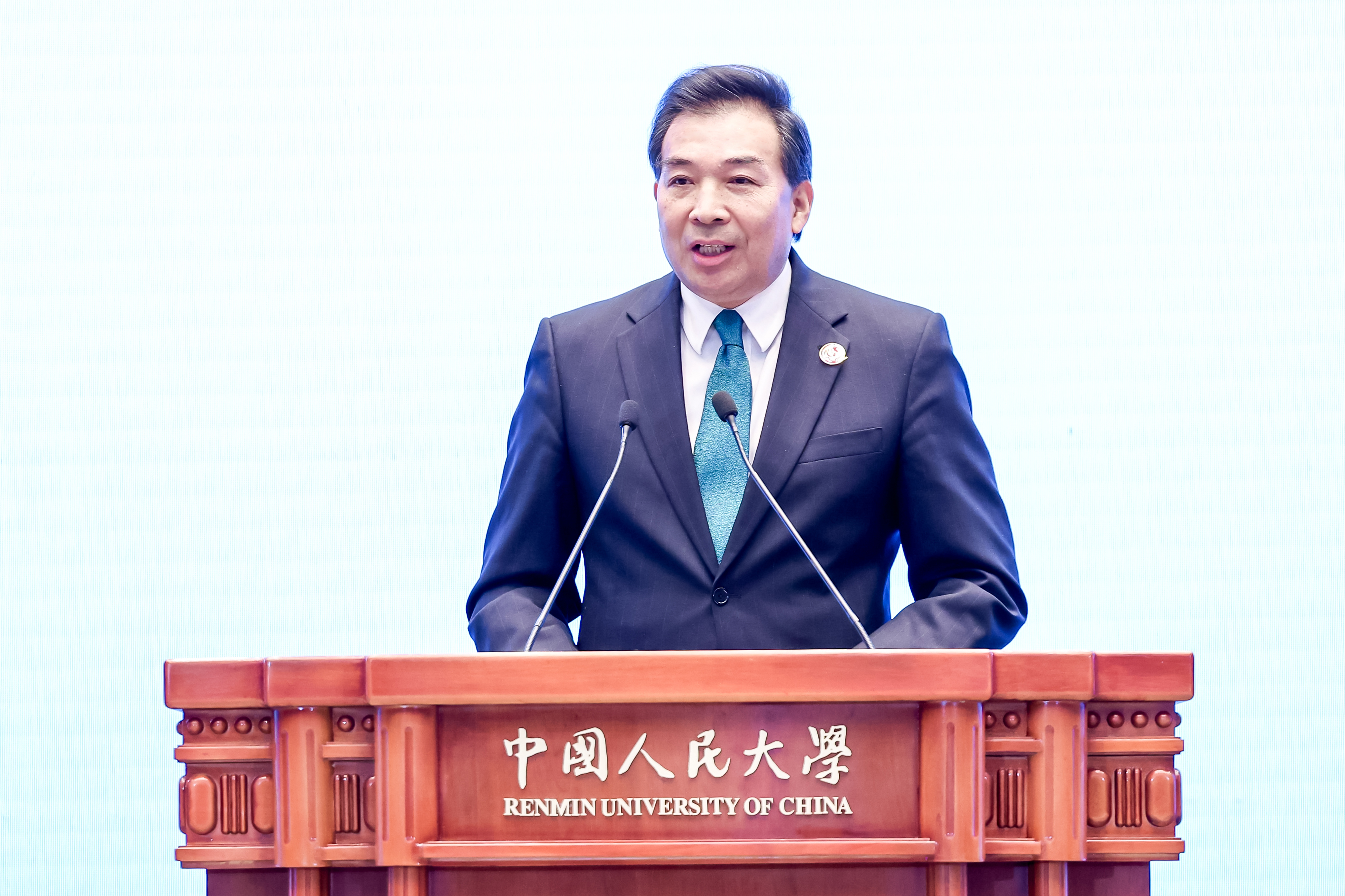
Luo Zhaohui addressed the forum as a special guest. He said that, in the new era, China had made remarkable achievements by prioritizing development, sparing no effort in promoting global development cooperation and engaging in in-depth global governance. At present, in the context of global development, with the intensification of the rivalry among major countries, the slowdown in North-South cooperation and the widening of the development gap, we should show greater commitment and action in strengthening the leading role of the United Nations, deepening cooperation among countries, promoting the common development of the “Global South”, and integrating security and development, as well as unifying and joining hands in the implementation of the “Three Global Initiatives” and the joint construction of the “Belt and Road”. We should show greater commitment and determination in strengthening the leadership role of the United Nations, deepening cooperation among countries, promoting common development in the “global South”, integrating security and development, unifying global efforts, walking hand in hand, and making new contributions to the implementation of the “Three Global Initiatives”, the “Belt and Road Initiative”, the sustainable development of the world and the realization of the world's modernization.
During the event, the report of “2023 Tongzhou Global Development Forum”—Development as the Solution, Globe as the Platform for Development—was released. According to the report, problems and challenges existing in today’s world call for solutions through development and the transformation of development modes. The global development path to 2050 should stay committed to development as a priority, placing it at the top of the national agenda; stay committed to a people-centered approach, ensuring that development is shared by the people; stay committed to a fair, inclusive, and global community of shared development; stay committed to innovation-driven development, enhancing new dynamics for development; stay committed to harmony between man and nature, advance sustainable human development; and stay committed to an action-oriented approach, stay focused on practical actions to propel global development. China and the world’s intellectual community are facing the important task of creating and developing new, more robust development theories. We should focus on development and prioritize it as a key topic of knowledge production; we should forge effective development theories based on the example of Chinese modernization; and we should abandon a nation/state-centric perspective and adopt a vision for a global shared development theory.

Guo Yezhou said that the “Three Global Initiatives”, taken as a whole, contains a new vision of development, a new security and civilization and serves as a science-based answer to the conundrum of our times: what kind of a world we should build and how to build it. To promote global development and build a common future, we need to respect the diversity of civilizations and jointly promote world modernization, uphold the spirit of win-win partnerships and co-generate new momentum for global development, and adhere to the principles of extensive consultation, joint contribution and shared benefits, and make concerted push to boost the reform of global governance system.
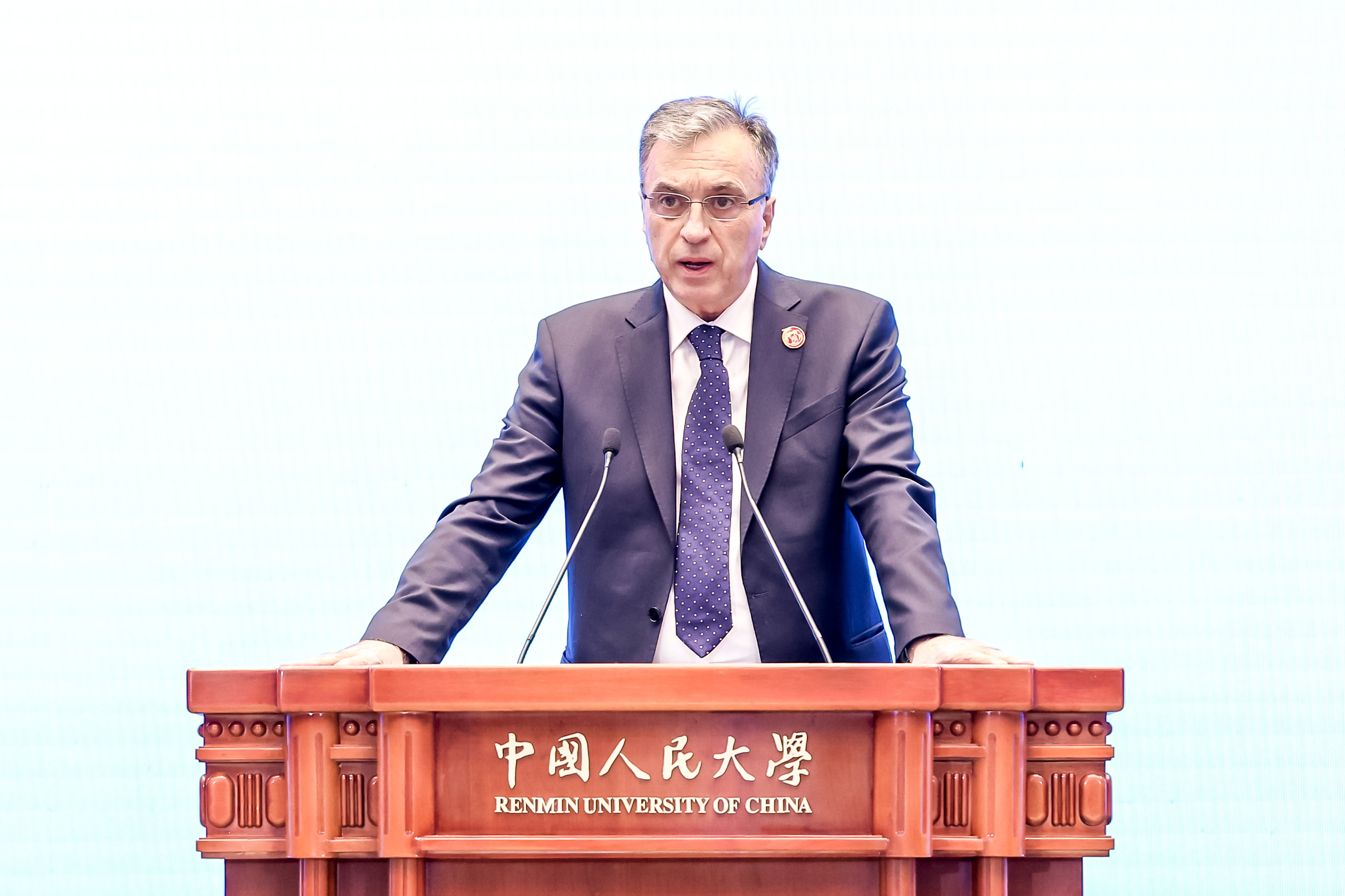
Filip Vujanovic said that the “Belt and Road” Initiative serves as a global public good and is widely welcomed by the international community, attracting the participation of 152 countries and 32 international organizations. Over the past decade, the Belt and Road Initiative has provided optimum safeguards for financing and the most stable approach to engage in business. It also enhanced the connectivity of partner countries in culture, education and art, fostered the genuine friendship between people from the participating countries and promoted mutually beneficial cooperation.
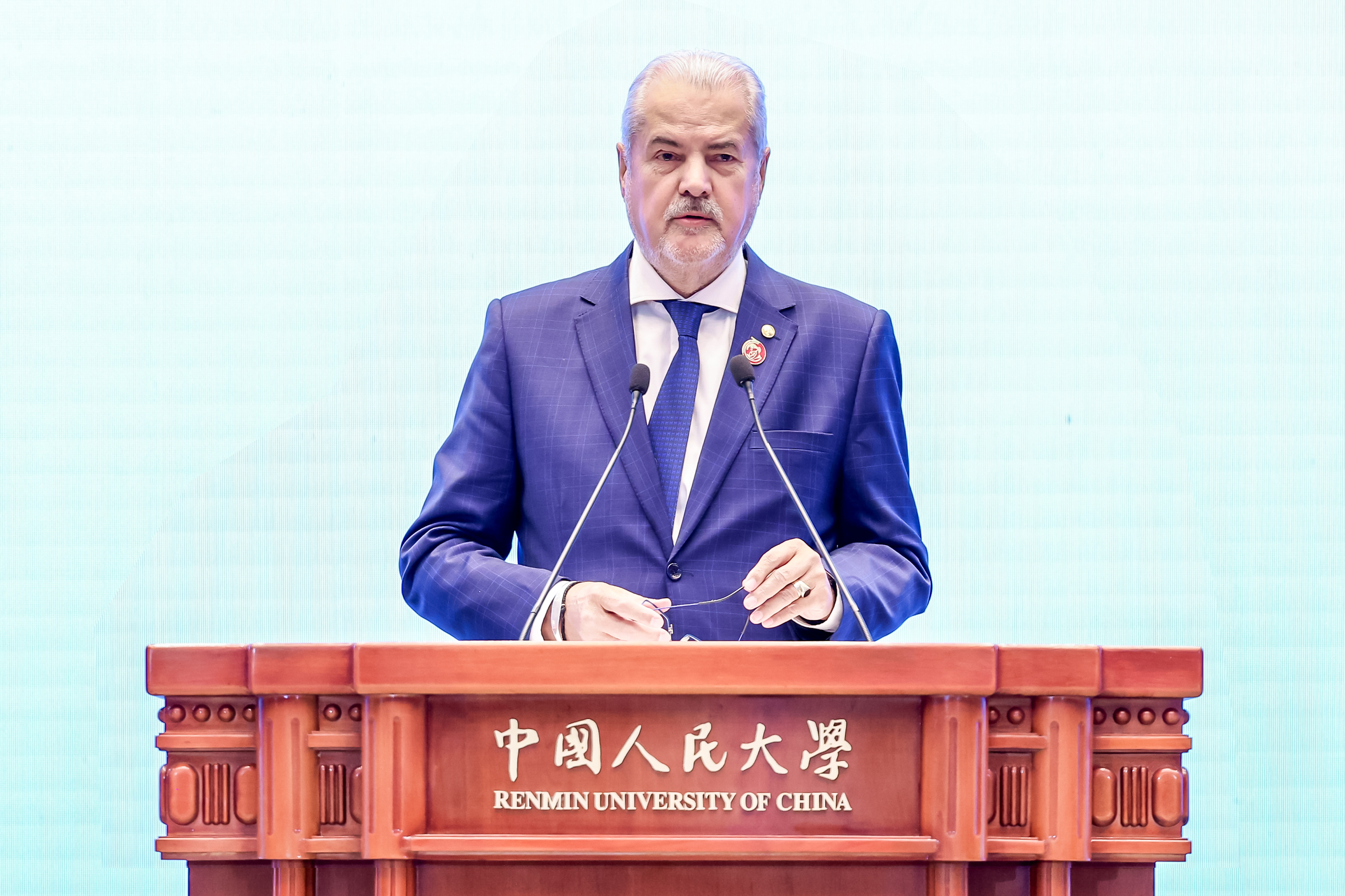
Adrian Nastase said that promoting global sustainable development is a major challenge and a shared responsibility of humankind that requires tangible actions by all countries. In recent years, President Xi Jinping has put forward a series of important initiatives to promote joint efforts to address various global challenges and promote common global development. As a member of the United Nations and a developing country, China has always insisted on seeking common ground while reserving differences in terms of global development visions, rules and standards, and has made unswerving efforts to promote North-South cooperation and solve problems faced by the world, thus setting a stellar example for the rest of the world in realizing common development.
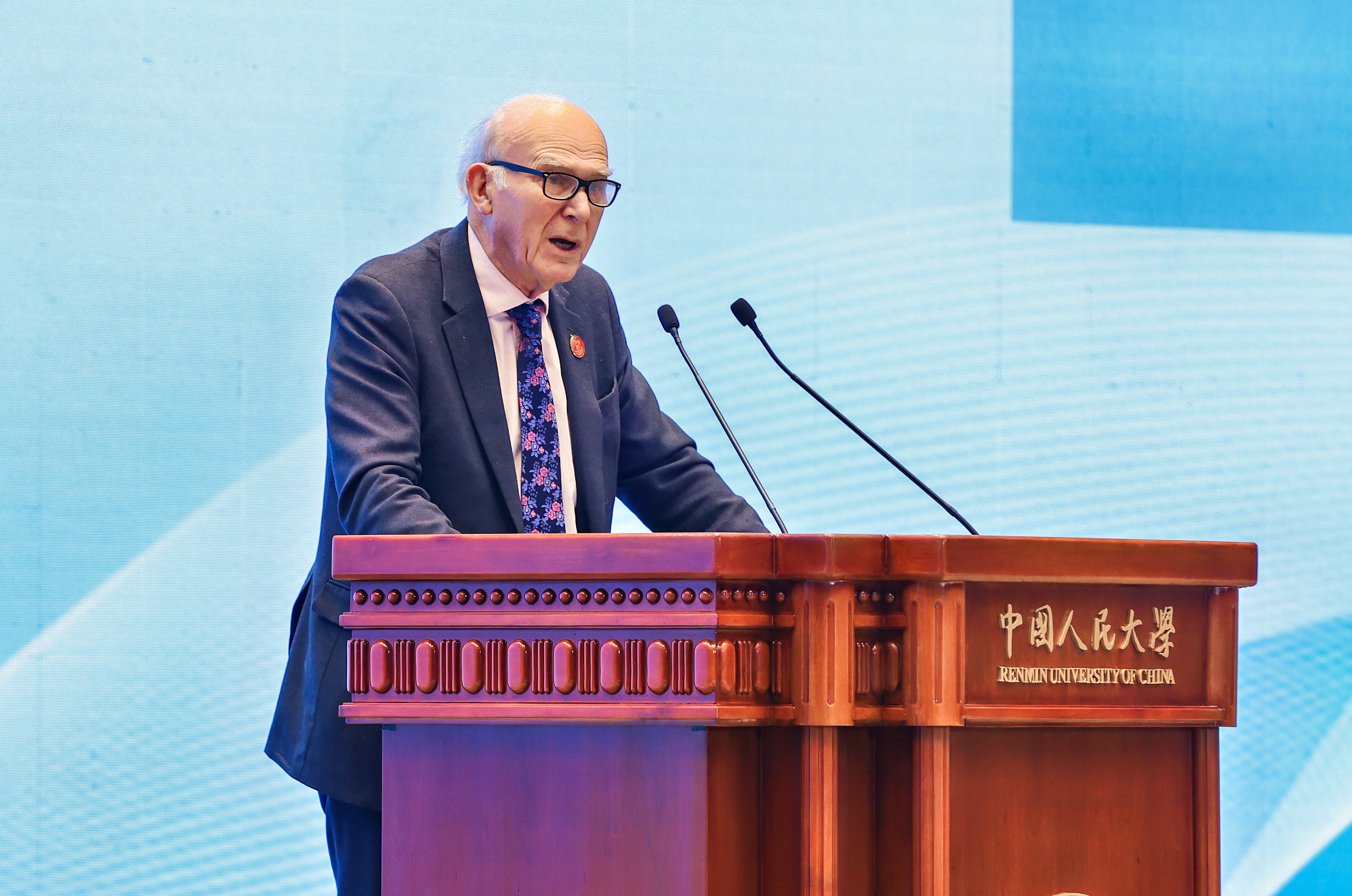
Vince Cable said that, with the implementation of the Three Global Initiatives and the building of a community with a shared future for mankind, China has the opportunity and ability to work with other countries to address global challenges such as climate change, human health and the imbalance between North and South in terms of economic development through dialogue and cooperation, and to play a more proactive and greater role in upholding multilateralism, enhancing mutual learning between civilizations, and promoting the transformation of the global governance system.
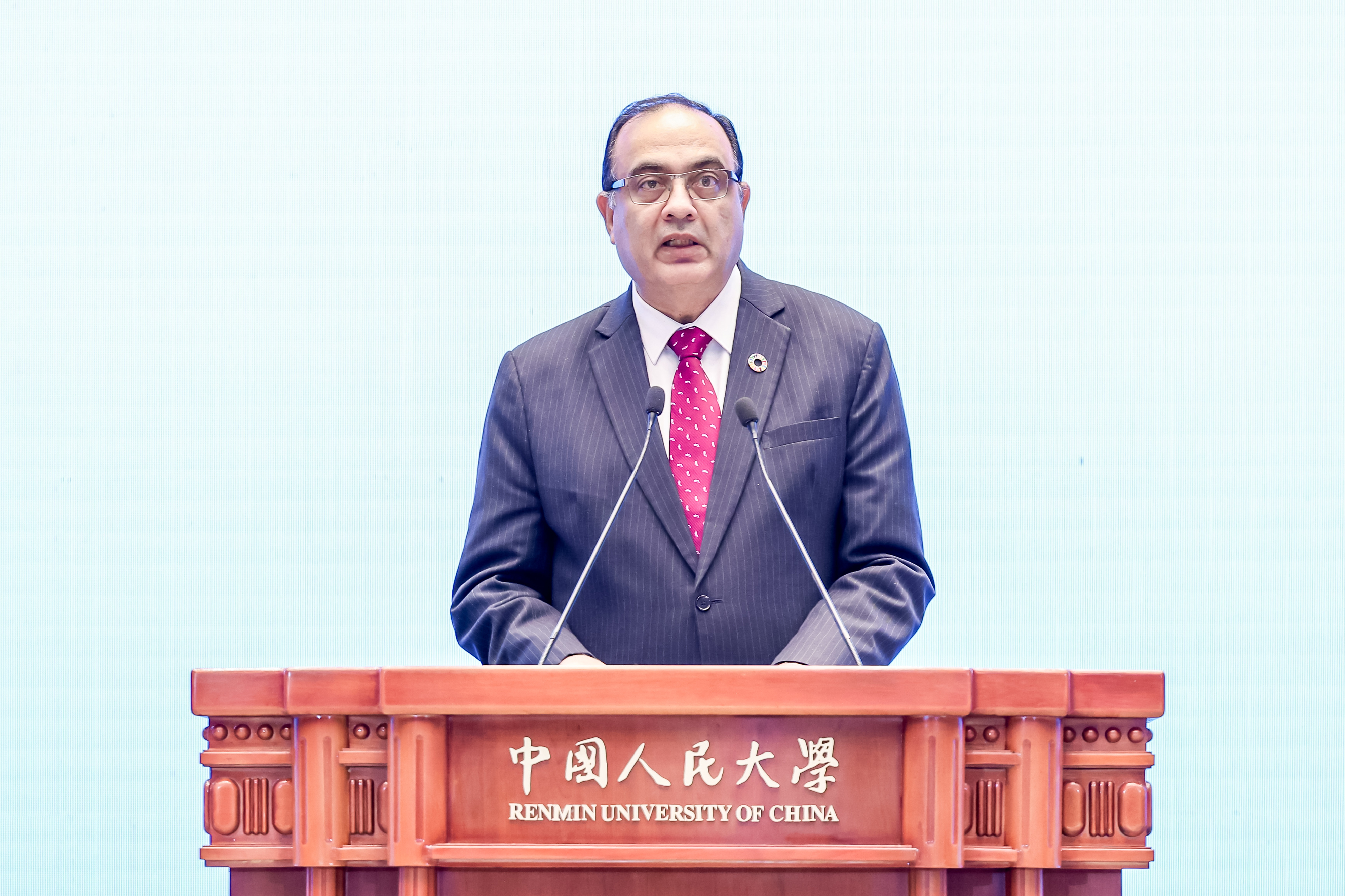
Shahbaz Khan said that the 2030 Agenda for Sustainable Development guides us to build a fairer, more just and sustainable world. China has always been committed to being a builder of world peace, a contributor to global development and a defender of international order, which is consistent with the ideals enshrined in the UN Charter. “The Three Global Initiatives” fully reflect China’s determination and commitment to actively engage in international cooperation and dialogue and to promote common global development in the areas of environmental protection, ecological civilization, poverty alleviation, education reform and cultural exchanges.

Meng Jingwei said that Tongzhou has been a hub of trade and commerce since ancient times. Entering the new era, Tongzhou has continued to impress the world with such efforts as boosting high-level reform and opening up, constructing advanced industrial structure, building high-quality city, pursuing high standard, smart and green development, improving well-being of the public, and realizing high-level synergistic development, among other frontiers. With the accelerated pace to deliver a new vision in Beijing where Tongzhou serves the auxiliary and supporting role in the capital while shares the prosperity with the capital, the district will usher in a new chapter of high-quality development. We hope that that more friends at home and abroad would get involved in the construction of the sub-center at a higher level, a wider range and a deeper extent, and advance in parallel with Tongzhou to lay down a more promising blueprint for the future.
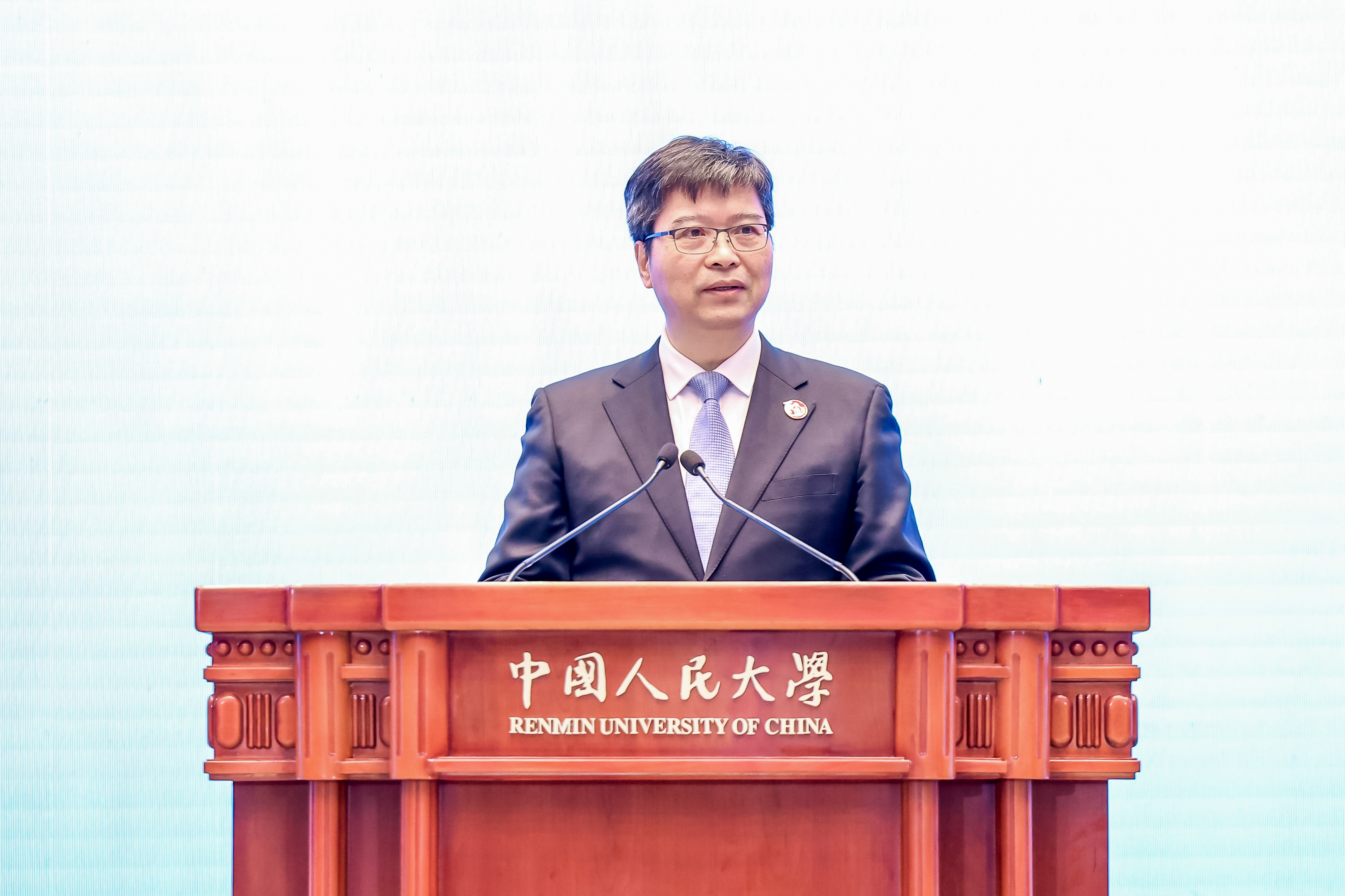
Lin Shangli said, when presiding over the forum, that the “Three Global Initiatives” are interwoven, interdependent and mutually reinforcing, providing strong support for the construction of a community with a shared future for mankind, and providing Chinese wisdom and Chinese programs to cope with the changes in the world, the times and history. As the first new type of formal university founded by the Communist Party of China (CPC), Renmin University of China has always adhered to the principles of “China-based, world-minded, integrating China and the world”, and has actively promoted the research and interpretation of the “Three Global Initiatives” and its implementation, and has endeavored to become a learner, a disseminator, and a practitioner of the philosophy of community with a shared future for mankind. It is hoped that attendees to the event will join efforts, undertake the grand mission of building a community with a shared future for mankind, work hard to gather positive global energy, and jointly address the concerns of China, the world, the people and the era, thereby contributing to the advancement of the new era by promoting global development, safeguarding global security and fostering global civilization.

Wang Guan, CGTN Anchor at CMG, moderated the strategic dialogue session. Cui Tiankai, Former Vice-Minister for Foreign Affairs and former Ambassador to the United States and Japan. Martin Jacques, Former Senior Fellow of Department of Politics and International Studies, Cambridge University (UK), Wu Xiaoqiu, National First-class Professor, Dean of the National Institute of Finance, Renmin University of China, Martin Mueller, Chairman of the Swiss Chinese Chamber of Commeree ,Chen Wenling, Chief Economist of China Center for International Economic Exchange (CCIEE), Mohammad Saqib, Secretary General, India China Economic and Cultural Council (ICEC), shared information on the topic “New Challenges and Future Solutions for Global Development”.
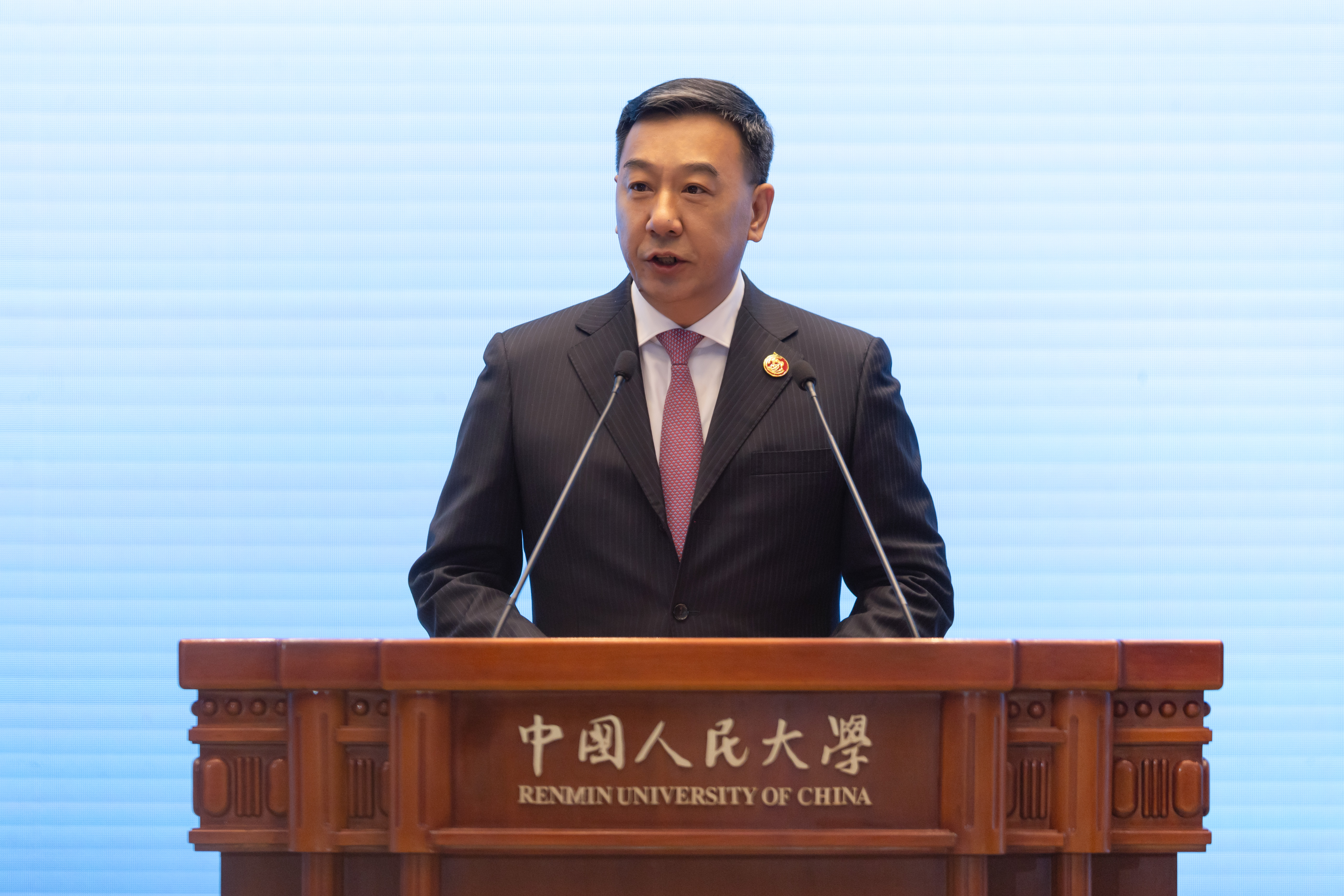
Zhang Donggang presided over the Closing Ceremony of the forum. In his closing summary, Mr. Zhang Donggang commented on how development is the eternal theme of human society. In the world today, a once-in-a-century profound transformation in the global landscapes is unfolding at an accelerated pace and the world is once again standing at the crossroads of history. We should strengthen our confidence in development, reshape our philosophy of development, explore the path of development, and jointly produce the fruits of development. As the world’s largest developing country, China has always been committed to promoting global development cooperation, sharing its benefit with the rest of the world, incorporating its own development in the development of mankind, and creating more new development opportunities for the world through its own development. Renmin University of China will fully leverage its unique role of philosophy and social sciences in integrating Chinese and foreign cultures and enhancing civilization exchanges, and unswervingly implement President Xi Jinping’s “Three Global Initiatives” to answer the questions of “What is happening with the world?” and “Where is humanity headed?”. By organizing high-profile exchanges and dialogues such as the “Tongzhou Global Development Forum”, we will continue to expand consensus, inspire confidence and gather strength for global development, and strive to promote the development of national powerhouses, national rejuvenation and the building of a community with a shared future for mankind.
At the Closing Ceremony, Mr. Zhang Donggang announced seven initiatives proposed by the “Tongzhou Global Development Forum”. First, focus on broadening global development cooperation by being ‘based in Tongzhou, rooted in Beijing and China, facing the world’, adhering to the principle of openness, constructing a global academic cooperation network, building a platform for high-end strategic dialogues and cooperation, and promoting the formation of a new landscape with development as the solution, globe as the platform for development, and peace and development as the end.
Second, focus our efforts on promoting global development priorities, uniting the global intellectual community, creating more public intellectual results that advance the course of human civilization, producing more new knowledge results that serve economic and scientific progress, and helping to realize people-centered, inclusive, innovation-driven, and healthy development in which people and nature live in harmony.
Third, focus on addressing global security challenges, give full play to talent and intellectual strengths, promote knowledge, theory and methodological innovation, and actively respond to global issues such as cybersecurity, biosecurity, data security and AI security, so as to mitigate and resolve security risks.
Fourth, focus on optimizing global security governance, vigorously cultivate talents in global governance who care about the world and serve the well-being of mankind, actively participate in the research of major global issues, effectively practice and promote the common values shared by mankind, and promote the development of global governance in a more just and reasonable direction.
Fifth, focus on enhancing global civilizational exchanges, strengthening international academic exchanges and cooperation, improving the mechanism for humanistic exchanges between China and foreign countries, expanding exchanges between youths and the education community, constructing a new carrier for global civilizational dialogue and cooperation, and promoting exchanges and mutual understanding among the world’s various civilizations.
Sixth, focus on promoting the progress of global civilization, shoulder new cultural missions, respect the diversity of world civilizations, actively engage in civilization inheritance and innovation, and promote the creative transformation and innovative development of outstanding traditional cultures of all countries, so as to jointly promote the development and progress of human civilization.
Seventh, a permanent mechanism for the Forum will be established, with the permanent venue set in Tongzhou, and a 24/7 operation model will be adopted to promote the implementation of relevant initiatives.

During the closing ceremony, Mr. Qin Xuan, Dean of the Academy of Xi Jinping Thought on Socialism with Chinese Characteristic for a New Era, Renmin University of China, John Ross, Daryl Guppy, National board member of the Australia China Business Council, the Australian representative on the Silk Road Chambers of International Commerce, Australia, and Di Dongsheng presented the results of the four parallel sessions respectively.
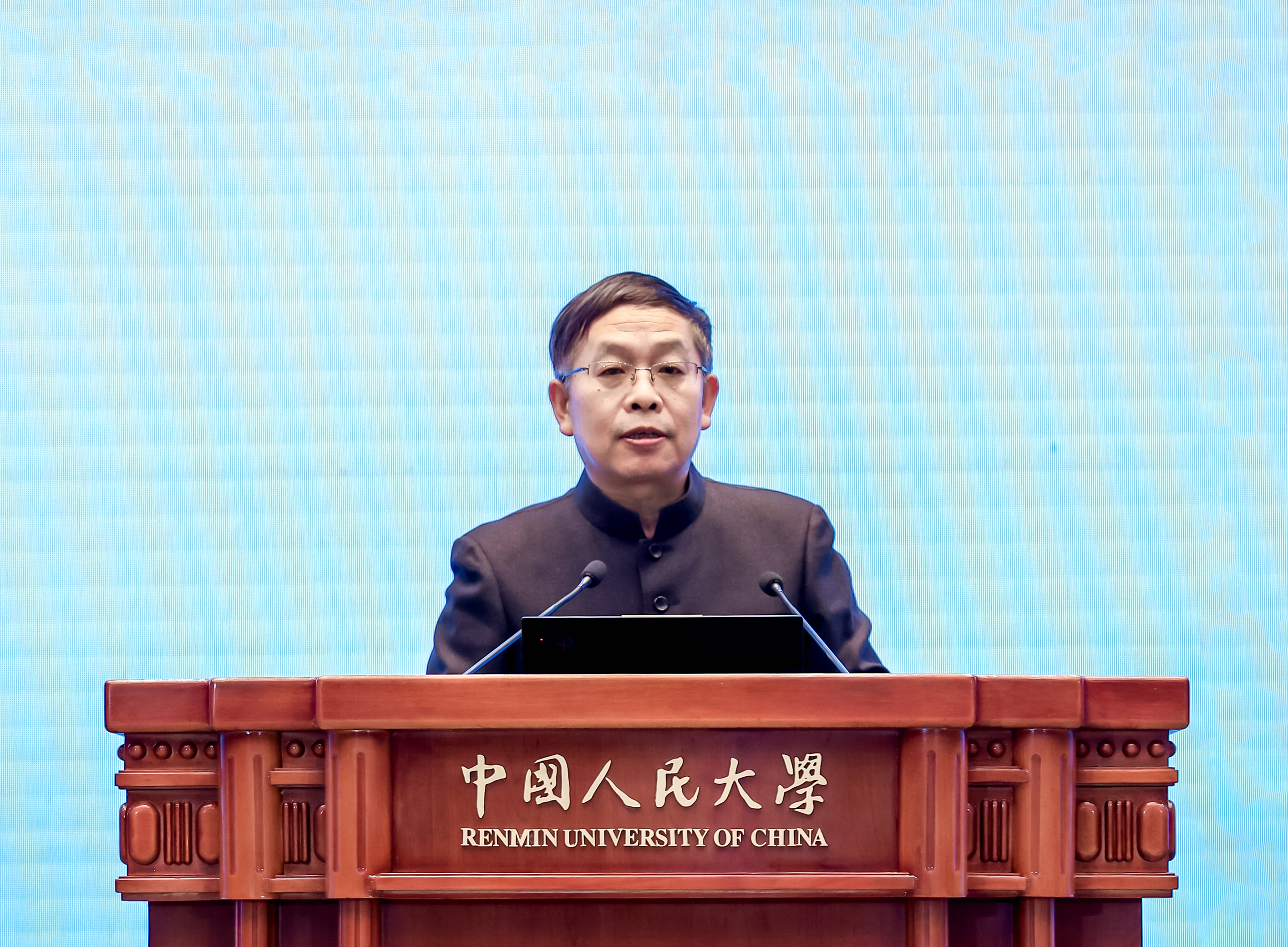
At this year’s Forum are four parallel sessions.
At the parallel session on “Shared Human Values and Global Development”, Qi Pengfei, Vice Chair of the University Council, Renmin University of China, and Zang Fengyu, Dean of the School of Philosophy of Renmin University of China, moderated the seminars on “Exchanges and Mutual Learning Among Civilizations & the New Form of Human Civilization” and “Building a Global Community of Shared Future and Global Development” respectively.

At the parallel session on “Chinese Modernization and Global Economic Development”, Ye Kangtao, Vice President of Renmin University of China, and Yu Ze, Deputy Dean of the School of Economics of Renmin University of China, moderated the seminar on “China’s Driving Force and Practice for Open Global Development” and “New Choice and New Paradigm of Global Modernization” respectively.
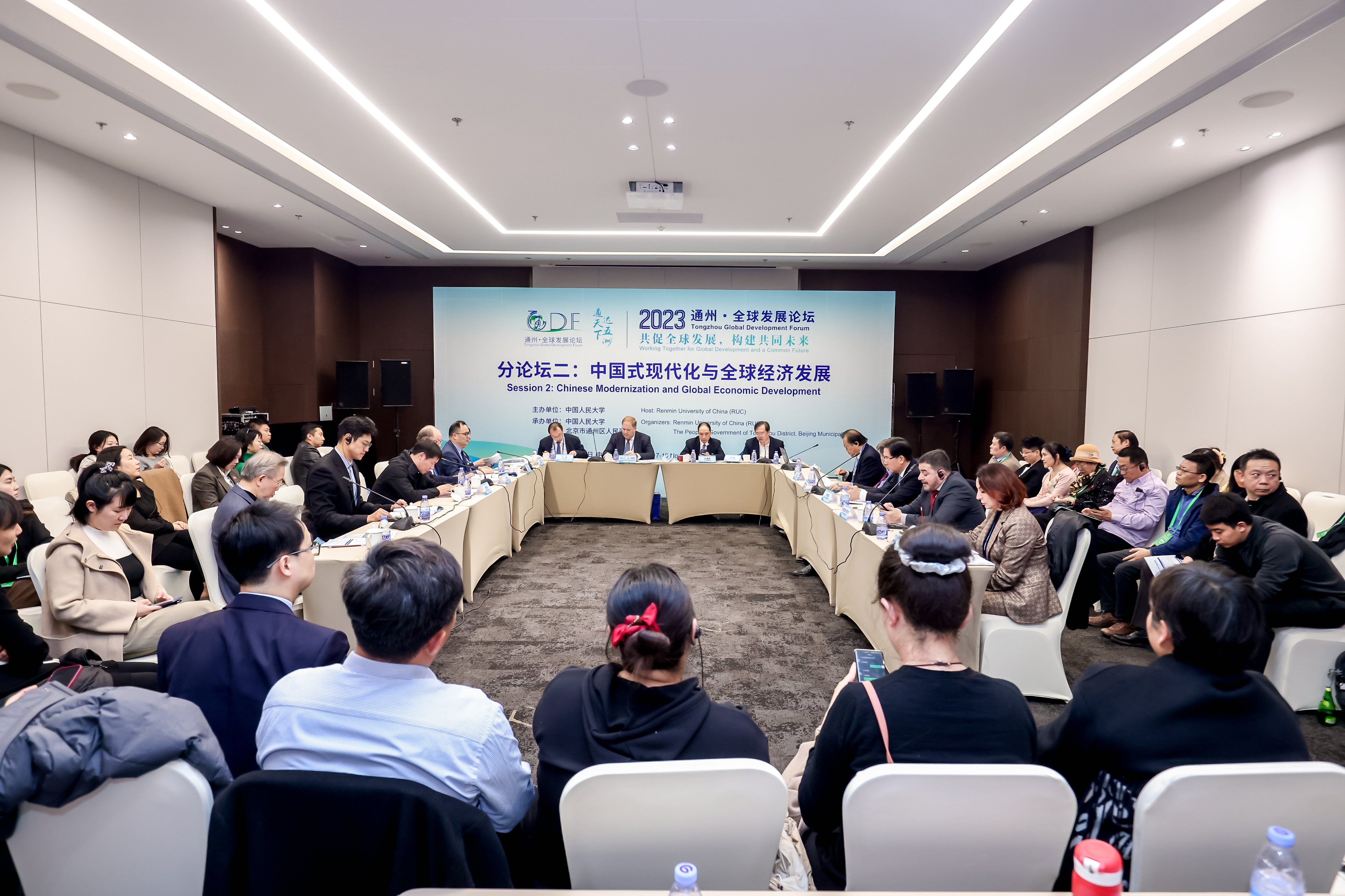
At the parallel session on the theme of “Global Development and Restructuring of Global Governance System”, Zhu Xinkai, Vice President of Renmin University of China, and Wang Wen, Executive Dean of Chongyang Institute for Financial Studies of Renmin University of China, moderated the seminar on the theme of “Shared Development: Global Initiatives and the Restructuring of Global Governance System”, “Building the Future Together: High-Quality Development and Global AI Governance” respectively.

At the parallel session of “Win-Win Cooperation: Exploring New Opportunities for Global Development”, Zheng Shuiquan, Vice Chair of the University Council of Renmin University of China, and Di Dongsheng, who in charge of the School of Global and Area Studies and the Associate Dean & Professor of the School of International Relations of Renmin University of China, moderated the seminar on “Global Political Economy: Striving for Win-Win Cooperation” and “Global Security: Building Peace in Partnership” respectively.
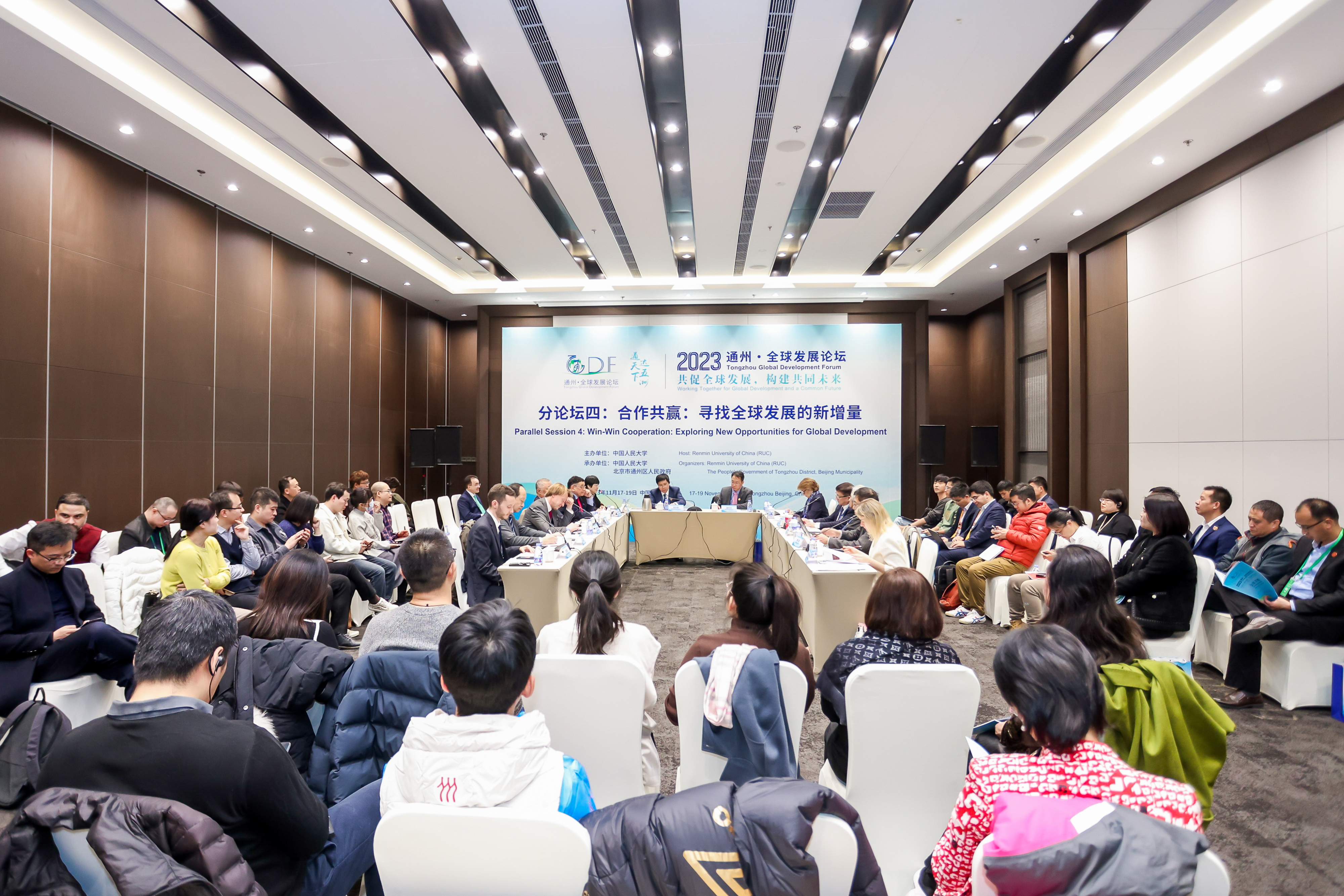
At this year’s Forum are four parallel sessions, 2 of which have been successfully held on Nov 18. Mr. Wu Fulai, Vice Chair of the University Council, Secretary of Committee for Discipline Inspection, State Supervisory Commission in Renmin University of China Ombudsman delivered a speech on “The New Development Philosophy and the Community with a Shared Future for Humanity”; and Wang Yi, Vice President of Renmin University of China, delivered a speech for the academic dialogue on “High-quality Development and Chinese Modernization”. The rest two sessions held on Nov.19 in which Mr. Lin Shangli, President of Renmin University of China and Mr. Alexandre de Navailles, Director General, KEDGE Business School, engaged in a dialogue and Bodrunov Sergey, President of the Free Economic Society of Russia, President of the International Union of Economists, Director of Witte Institute of New Industrial Development, Corresponding Member of the Russian Academy of Sciences, Russia, deliverd a lecture on “New Drivers, New Opportunities and New Space for China-Russia Economic and Trade Cooperation”.
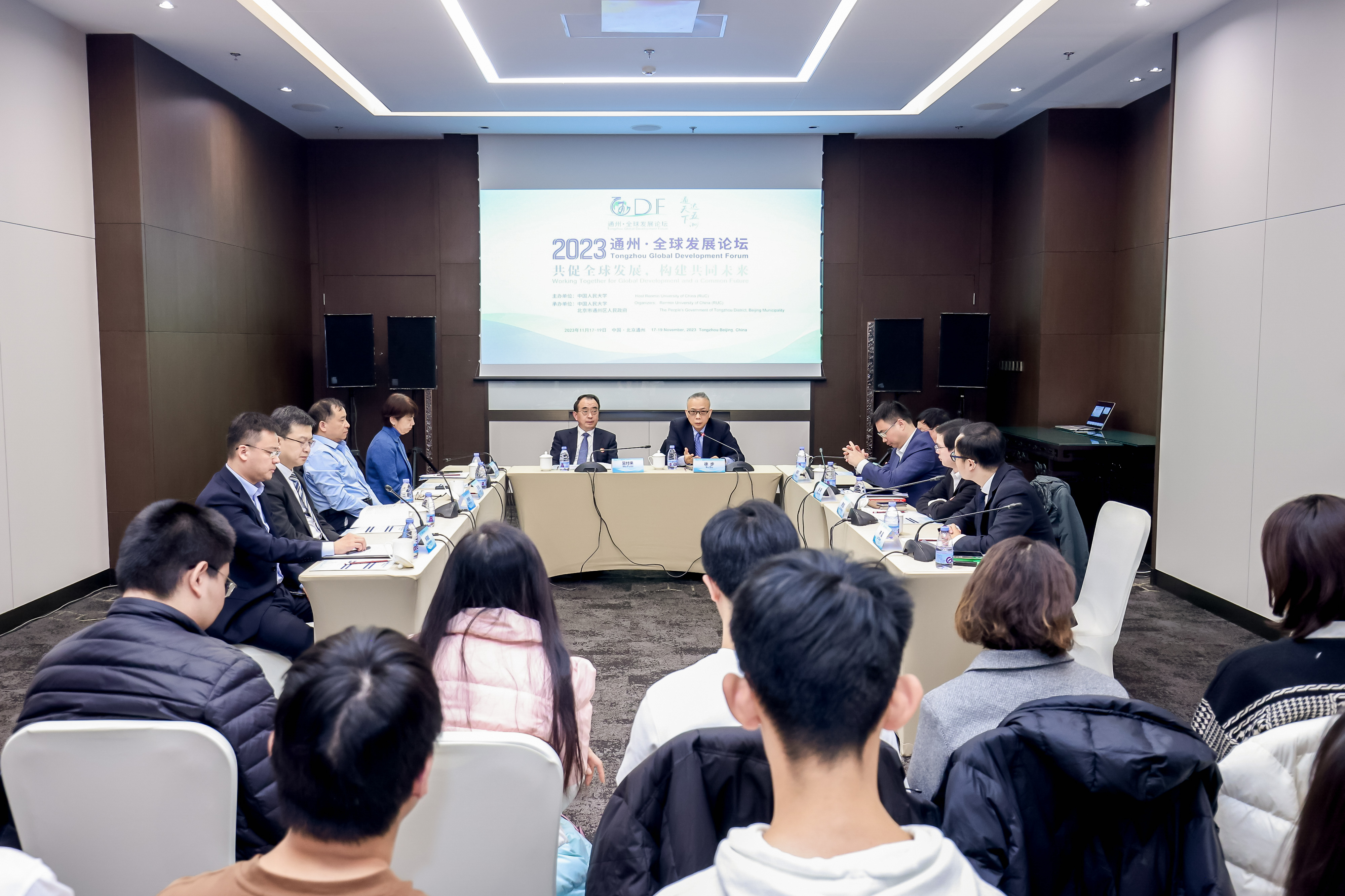
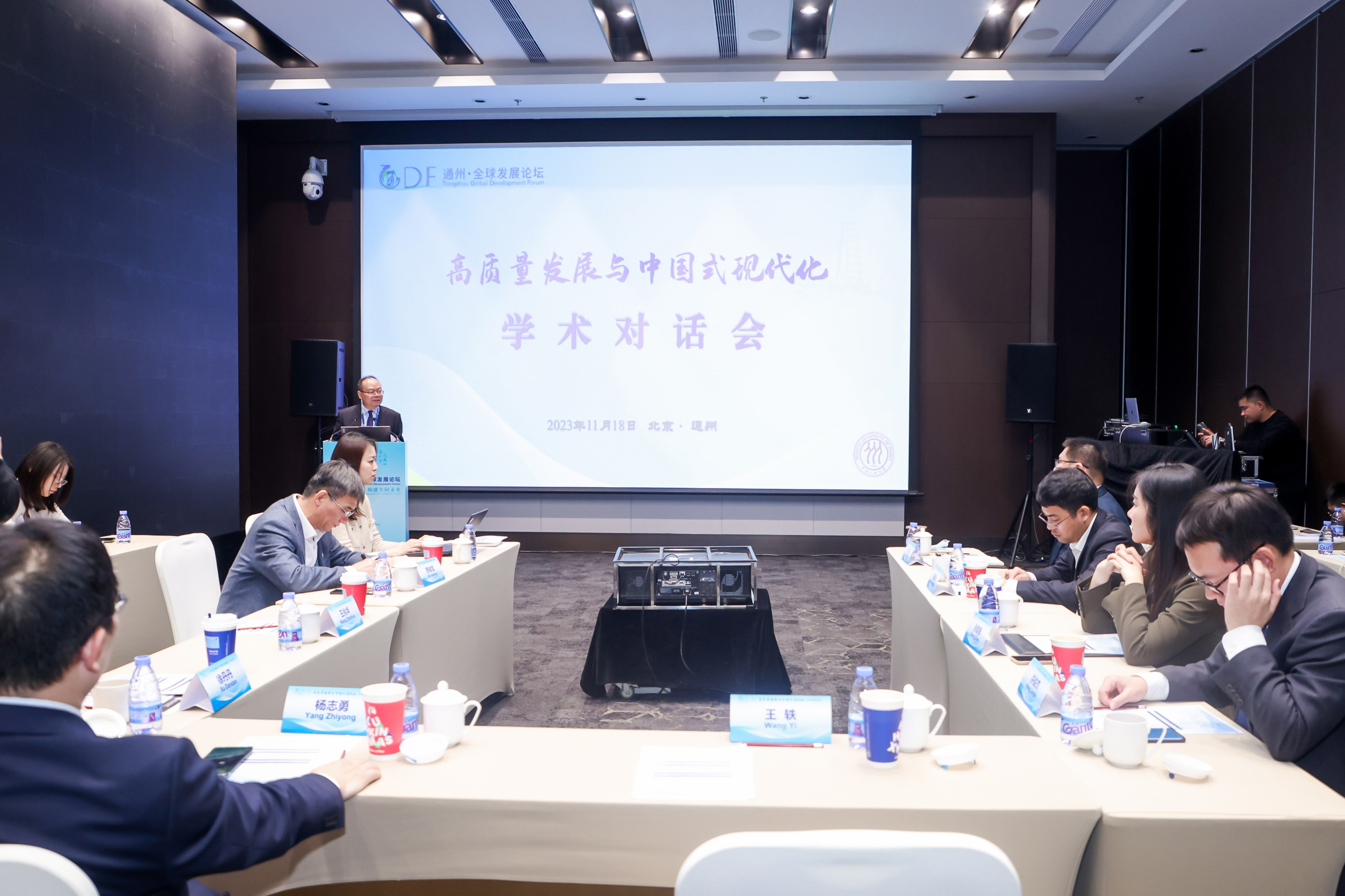
During the Forum, the cultural dialogue on “Tongzhou Grand Canal and World Civilization” and the strategic dialogue on “Digital Economy and Global Development” were also held.
During the two-day forum, more than 400 guests from over 30 countries around the world exchanged ideas and shared their experiences, planned a new blueprint for development and set out a new script of cooperation.

From 20th to 23rd of November, a part of guests are to visit Zhejiang to participate in a sub-event of the 2023 “Tongzhou Global Development Forum”. The events to be attended include the 2nd WZBC Wenzhou Entrepreneurs Forum (2023) “China’s Private Economy and How Wenzhou Entrepreneurs Go Global”, and the international symposium and report release on “Ten Years of Belt and Road Financial Cooperation and Zhejiang’s Contributions” in Hangzhou.



